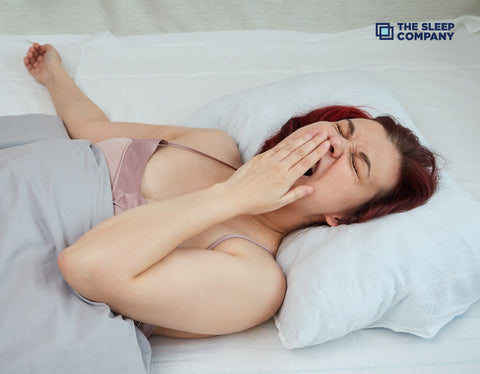My Cart

What Is A Normal Sleeping Heart Rate By Age?

Your heart rate fluctuates during the day based on what you are doing. In fact, it is at its lowest when you are asleep, between 40 to 50 beats per minute (BPM).
But did you know? Your heart rate can help you evaluate your overall health and fitness levels. It can be a useful tool to steer you in the right direction.
Ahead, let's take a deeper look at what a normal heartbeat during sleep should look like by age.
What Is the Average Sleeping Heart Rate by Age?
The below table will tell you the average heart rate by age. Take a look. This will give you an idea of what your heartbeat when sleeping should be.
| Age Group | Average Sleeping Heart Rate (BPM) |
|---|---|
| Newborn (0-1 month) | 70-190 |
| Infants (1-12 months) | 80-160 |
| Toddlers (1-4 years) | 80-120 |
| Children (5-12 years) | 70-110 |
| Teens (13-17 years) | 60-100 |
| Adults (18-65 years) | 40-60 |
| Seniors (65+ years) | 50-70 |
What Is the Sleeping Heart Rate?
For a normal adult, the average resting heartbeat is between 60 to 100 BPM. This range may be lower in younger individuals, athletes, or those with an active lifestyle. This is because the cardiovascular efficiency is better.
However, as you hit the sheets and slide into dreamland, your heart rate slows down compared to when you are awake.
So, a sleeping heart rate is the number of times your heart beats per minute while you are asleep.
1. REM Sleep
During REM, you are in a light sleep stage. Here, the heartbeat during sleep can vary as per the brain activity.
2. Non-REM Sleep
This is a deep sleep stage where your blood pressure and heart rate take a dip to give your heart a break so it can repair and recover.
It's always good to keep an eye on your heart rate during sleep as it can help you spot potential health problems. If your heart rate is unusually high or low, it’s a good idea to talk to a doctor.
Factors That Affect Sleeping Heart Rate
Here are a few factors that influence your sleeping heart rate.
1. Physical Fitness Plays a Role
If you are someone who is physically fit or leads an active life, your heartbeat during sleep tends to be lower than normal. This is because regular exercise can strengthen the heart and pump it more efficiently.
2. Stress and Anxiety Can Be the Culprit
Stress and anxiety tend to raise your heart rate, even when you are asleep. This is because the body's fight-or-flight response speeds up the heart and makes it difficult for it to relax.
3. Sleep Quality and Duration Is Important
If poor quality of sleep is a regular thing or you don't get the amount you need every night, this can cause a higher heart rate during rest. When you don’t get enough deep sleep, your heart tends to work harder to compensate for the lack of recovery.
4. Age-Related Changes Impact Heart Rate
As we age, the heart doesn't function as efficiently as it used to. Therefore, you may notice a slightly higher sleeping heart rate. In fact, as you age, your heart rate during rest goes up.
5. Medications and Supplements Can Be the Issue
Some medications, such as blood pressure drugs, can affect your heart rate even during sleep. It is essential to speak with a doctor if it is interfering with your sleep.
6. Chronic Health Conditions Can Be the Reason
Health conditions like high blood pressure, heart disease, or diabetes can affect how the heart works and may cause an elevated heartbeat during sleep. These health issues can prevent the heart from resting as effectively during sleep.
7. What Is Your Hydration And Nutrition Status?
Did you know? Dehydration is actually linked to your heart's ability to function properly. When the body isn’t properly hydrated or nourished, the heart may have to work harder, and this raises your heart rate.
8. Keep an Eye on Caffeine or Alcohol Intake
Going to sleep after consuming alcohol or caffeine can hamper your sleep. And here, your heartbeat increases during sleep. Caffeine is a stimulant, while alcohol can affect the quality of your sleep, leading to a higher heart rate while you rest.
9. Hormonal Fluctuations or Cycles
Hormones play a big role in regulating body functions, including heart rate. But when you are going through hormonal changes, such as menstruation, pregnancy, or menopause, you may experience variations in your heartbeat rate during sleep due to shifts in hormones like estrogen and progesterone.
10. Room Temperature and Comfort Is Necessary
A room that's too hot or too cold can disturb sleep and raise your heart rate. So, staying comfortable is important. Otherwise, your body might struggle to relax, and your heart may beat faster.
How to Measure Sleeping Heart Rate?
Measuring your heartbeat during sleep isn't too difficult. In fact, when you understand it better, it helps you know your health well. The simplest way is to use a wearable device like a smartwatch, fitness tracker, or chest strap. These devices monitor your heart rate automatically while you sleep and give you a detailed report in the morning.
If you don’t have a tracker, you can measure your heart rate manually by checking your pulse right after waking up. Place two fingers on your wrist or neck, count the beats for 60 seconds, and record it. For the best results, try to measure it at the same time each morning.
Why Does a Healthy Sleeping Heart Rate Matter?
Knowing what your heartbeat is during sleep helps you understand how well your heart is working. As aforementioned, when we snooze, our heart takes a pause. This is when it relaxes and slows down. This helps in repair and recovery so it can support you with ease the next day. A lower heart rate reduces strain and regulates high blood pressure.
If your heart rate during sleep is consistently too high or too low, it may be a sign of stress, poor fitness, sleep disorders, or heart problems.
Tips for Maintaining a Healthy Sleeping Heart Rate
Now, without any further ado, let’s take a look at the best tips to maintain a healthy sleeping heart rate!
1. Exercise Regularly for Heart Health
We have always been told exercise is good for health. But did you know? It can be extremely beneficial for the heart. So, exercising regularly makes the heart more efficient in pumping blood. This helps lower your normal heartbeat during sleep.
If you are someone who leads a sedentary lifestyle or doesn't get much exercise, take this as your sign to start today.
You don't have to do anything vigorous if you don't want to. 30 minutes of moderate exercise like walking or swimming is sufficient. Even in the long run, exercise benefits your cardiovascular health.
But make sure you avoid exercising too close to bedtime as it can increase your heartbeat and make it difficult to fall asleep.
2. Practice Stress-Reducing Techniques before Bed
Stress is a culprit that can prevent you from enjoying a good night's rest and can lead to an increase in heartbeat as you snooze.
So, if stress tends to creep in every now and then, learn to practice stress-busting techniques.
Here, you can try deep breathing exercises or meditation before bed. Infact, something as simple as listening to soothing music can be beneficial.
Make sure you create a peaceful evening routine to help reduce the release of stress hormones.
3. Maintain a Consistent Sleep Schedule
Our parents and grandparents have always believed in the importance of a consistent bedtime routine. This must have been one piece of advice that most of us have heard growing up. Well, as it turns out, they were right.
Going to bed and waking up at the same time keeps the internal clock running fine. But that's not all.
A consistent bedtime routine allows your heart to rest and recover during rest. And when the sleep schedule becomes irregular, it can lead to fluctuations in your heart rate. Even on weekends, stick to the same sleep routine.
4. Avoid Heavy Meals before Bedtime
Food cravings are real. Sometimes, a juicy burger or a cheesy pizza can seem like a good idea. However, consuming large, heavy, or greasy meals before bed can make it hard for the body to relax. This elevates your heartbeat because your body is hard at work, trying to digest all the food.
So, if you are wondering why the heart beats hard during sleep, a heavy meal can be the reason. Also, make sure you enjoy your dinner at least two to three hours before bed. This keeps your heart at ease as you enjoy a comfy slumber.
5. Limit Caffeine and Alcohol Intake
We have all been there when deadlines seem difficult or unexpected projects need to be completed late in the evenings. Here, a cup of coffee or chai seems like a great idea. However, coffee, tea, and energy drinks can do more harm than good when consumed late in the afternoon or evening.
And, if you are wondering why heart beat increases during sleep, alcohol can also be the reason. While a few drinks can induce drowsiness, it disrupts sleep quality and can increase heart rate while you snooze.
Therefore, if you enjoy a beverage before bed, icy water or herbal tea can be beneficial.
6. Stay Hydrated Throughout the Day
Another easy tip to keep your heartbeat during sleep low is to keep yourself hydrated throughout the day.
Poor hydration or dehydration makes it faster to maintain blood flow. The thumb rule here is to consume 30 ml/kg. That said, make sure you don't consume too much water right before bed as it can lead to frequent bathroom breaks.
7. Create a Comfortable Sleep Environment
One of the ways you can relax and rest easily is to have a comfortable sleep environment. Remember, as soon as you enter your room, a sense of peace must engulf you. Otherwise, you are doing it wrong.
So, start with a comfy mattress. It must offer you a mix of support and comfort so you enjoy at least 7 hours of uninterrupted sleep each night. Then, pay attention to your pillows and bedding and see what more you can do.
You can even opt for blackout curtains and make sure your room keeps you cool enough as you sleep.
8. Avoid Using Screens before Sleep
The blue light from your phone, tablets, and computers can be harmful. It can suppress melatonin, which is your sleep hormone. So, spending too much time on your electronics before bed can interfere with your sleep. It can also increase your heartbeat during sleep and can delay relaxation.
Try to stop using screens at least 1-2 hours before bedtime. Instead, engage in calming activities like reading a book, journaling, or meditating.
9. Have a Soothing Bedtime Routine
A calming bedtime pre-sleep routine is best for your rest. It keeps you relaxed and helps you achieve deep sleep. Infact, these routines can lower your heartbeat during sleep.
Some of the things you can include in your pre-sleep routine are:
- Take a warm bath before bed
- Reading non-stimulating literature
- Take up meditation or deep breathing
- Enjoy a cup of herbal tea
When to Be Concerned About Heart Rate?
While a low heartbeat when resting is great, if it is too low, it's a cause for concern. If your heart rate drops below 40 bpm during sleep or rest, or if you experience symptoms, it could point to an underlying issue, such as heart block or thyroid problems, it warrants medical attention.
In the same way, when your heartbeat is too high when resting and if it exceeds 90 beats per minute, it is concerning.
Conclusion
Remember, for a healthy heart, a good night's rest is imperative. And in order to experience a peaceful sleep, you need your room's environment to match your needs. But it all begins with a high-performing mattress from The Sleep Company that strikes the right balance between comfort and support.
The Sleep Company also brings you fluffy plush pillows for robust neck support and quality bedding that can fetch you dreamy sleep. With The Sleep Company by your side, you can ensure you treat your heart right by giving yourself the best sleep experience.
Transform your slumber with The Sleep Company today!
FAQs
A normal sleeping heart rate is typically between 40 to 60 beats per minute (bpm) for adults, but it can vary depending on age, fitness, and health.
As you age, your sleeping heart rate may increase slightly. Children usually have higher heart rates, while healthy, active adults and athletes may have lower rates during sleep.
For most adults, a normal sleeping heart rate ranges from 40 to 60 bpm. This rate reflects the body’s relaxed state and varies with fitness and health levels.
Children have higher sleeping heart rates than adults, usually between 70 to 110 bpm, depending on their age. Newborns can have even higher rates, around 80 to 160 bpm.
A consistently below 40 bpm or above 100 bpm sleeping heart rate can be dangerous, especially if accompanied by symptoms like dizziness, fatigue, or breathing difficulties.
Yes, physical fitness can lower your sleeping heart rate. Regular exercise strengthens the heart. So, your heart can pump more efficiently.

































































